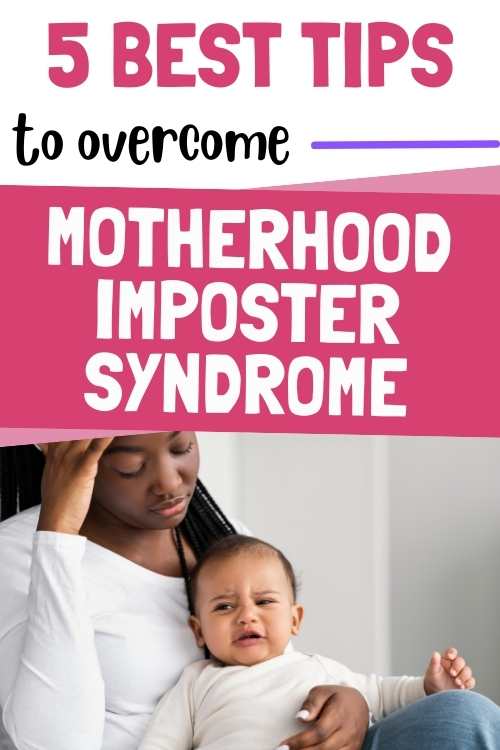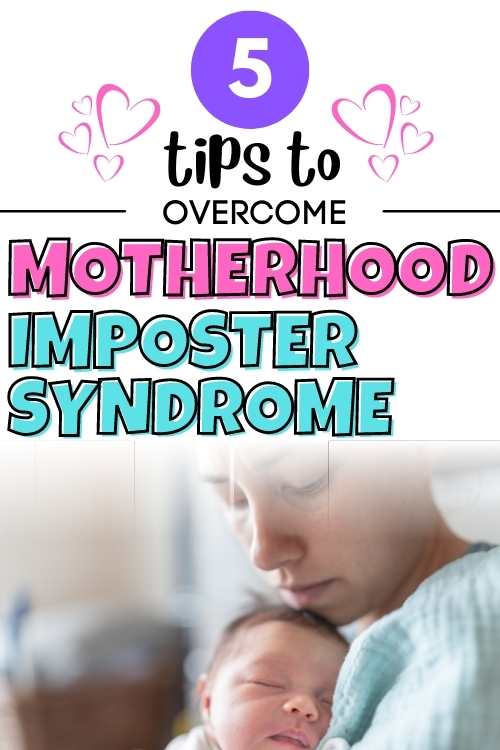Do you remember taking your baby home for the first time? The first unprepared diaper blowout? All those sleepless nights when other babies seemed to sleep so soundly without a fight?
It gets to you. And it makes you feel like you totally suck as a mom.
As your child gets older – or if you’ve popped out more than one – feelings of inadequacy can really get to you.
Like, shouldn’t you be a pro at this by now? Shouldn’t you know your own child?
This complex mix of self-doubt and guilt can ripple through your postpartum body like a painful fourth-degree perineal tear. Is there anything you can do to ease this heavy feeling, or are you destined for a life of lackluster parenting?
You’re in good company, mama, and not alone if this sounds like you.
Let’s learn about motherhood imposter syndrome and 5 ways you can combat it.
Related: What to really expect with your postpartum recovery

What is Motherhood Imposter Syndrome?
Motherhood imposter syndrome is when you doubt your mothering abilities and feel like a fraud. You feel like you don’t belong in this new world of motherhood (or, if it’s not your first child, you’ve screwed up your first and have no clue what to do with the next one!).
People can see that your children are well taken care of, yet you see your parental shortcomings and mistakes.
I forgot to pack his favorite cup.
I have no idea how to swaddle this kid, and his arm keeps coming out!!
I’m a terrible mom because I took her to the park, and now she has a runny nose.
Why haven’t I scheduled his doctor’s appointment yet? It’s four months overdue!
As a mom, it’s easy to believe that you don’t know what you’re doing, you aren’t doing enough, and your children will turn into no-good, very bad kids if you don’t get your motherhood act together.
You tell yourself you should be grateful for what you have, and it’s unacceptable to feel this way.
Comments from other parents and strangers may send you into a tizzy, like “Oh, he’s having another cupcake?”
It’s overwhelming, isn’t it?
Cue motherhood imposter syndrome.
5 Ways To Overcome Motherhood Imposter Syndrome
While these “you don’t deserve to be a mom” thoughts are common as a mother, you can take charge with how you deal with motherhood imposter syndrome by tweaking your mindset and connecting with others who have experienced the same (untrue!) belief.
Here are 5 ways you can practice overcoming motherhood imposter syndrome:
1) Choose to Thrive where you are Now
Thoughts are powerful. They can trick you into believing you aren’t good enough and don’t know what you’re doing or are even supposed to do. How could the birth center hand over your baby to you with you so woefully unprepared? What were they thinking?
Now, let’s reframe this. What are you thinking, mama?
Thoughts are thoughts, but that doesn’t make them all true.
What you’re struggling with now – you are equipped to handle whatever motherhood throws your way.
What you need to do is pause, feel, and breathe. Embrace your feelings, then release what’s no longer doing you good.
- What are your options?
- What can you tweak?
- How can you be more compassionate to yourself?
Because this is where you are now, mama. Dig your toes in, but don’t dwell here forever.
You are capable of everything you think you’re not.
So again: pause, feel, breathe, and choose to step into where you’re at now in your motherhood journey.
You may not have all the answers and feel confident 100% of the time. But – you can dismantle these negative thoughts and shape them into something more constructive.

2) Know that you Care Deeply for your Child
Anybody can get snagged by imposter syndrome, but perfectionists and high-achievers often get caught up the most.
Wanting to get everything right and having all the answers – and feeling down when you don’t – is especially true for moms. It shows that you care.
You are a good mother to your child, even when you don’t get everything ‘right.’
Even when you feel like you’re renting on Fraud Street. Or bought a house. (I bought a house with a picket fence that I’m slowly taking apart.)
Don’t let this self-doubt tell you that you aren’t a good mother.
This self-doubt may tell you that you’re an imposter of a parent and don’t deserve to be in the Motherhood Club. But what if you reframe those thoughts and interpret them as a testament to how much you care for your child?
- You know the beloved sippy cup your child reaches for, so you try your best to always pack it to daycare.
- You’re hyper-aware of your baby’s cries and cues (even if you aren’t sure what to do).
Take motherhood imposter syndrome as a sign of love for your child.
3) Open Up, because you’re Not Alone
It feels great to meet someone who’s got similar interests as us. It’s even better when someone else shares what they’ve experienced (or are struggling with), and their story is similar to ours.
I know that making mom friends can be challenging and scary. Throw in postpartum depression or anxiety and suddenly approaching a stranger to say an awkward “hi” is akin to swaddling a baby for the first time while mesh undies still cover your butt.
But, it’s not healthy for you to stay on Motherhood Imposter Syndrome Street by yourself.
Others have rented space there too. We have advice to share. Stories to tell.
Find your safe space and open up to others who can help or lend a listening ear.
When my first son was born, my mood was all over. I went from feeling naively confident to drop-dead terrified after my induced delivery. Surging hormones, intense hemorrhaging, hoo-ha pain, and rock-hard boobs were enough to shake my world.
Still, I had to figure out how to care for this 6-pound, 11-ounce squirmy child I deeply loved yet was also insanely anxious about.
So I spiraled into postpartum anxiety. At first, I held in my feelings and told no one. Not my husband. Not my parents, in-laws, friends, or doctor.
Thanks to a Facebook post written by a fellow mom in a mothering group I’m in, I realized our feelings were alike. I wasn’t the only one!
Heck, I’m normal.
Because of postpartum, I thought I was a bad mom for feeling phony and thinking intruding thoughts. I thought no one else could possibly think like me or be as motherly inept as me.
The point is: open up about how you’re feeling to people you trust.
Related: Signs of Postpartum Anxiety and Tips on How to Deal with it

4) Talk to Yourself like you would to a Friend
A good friend should be a good listener and an even better sidekick.
When the imposter-y thoughts pop up, think of channeling them through your kind, loving, ‘best friend.’
Stay with me now! Your ‘best friend’ here could be your real best friend or a fake persona your mind has created (and they could even rest on your shoulder like the little devil and angel on the Emperor’s New Groove – sorry, my kids are going through a phase).
- You: I should read to my child every night, so he gets a head start – but I’m always exhausted after work. I suck at this mothering thing!
- ‘Best friend’: You don’t suck at being a mom. You’re tired, like
mostall parents. Let’s try reading a few books on the days you get home from work earlier.
- You: Why do other moms seem to produce so much milk? I barely get an ounce. The doctor said I was doing everything right, but I must be doing something wrong now. My family will criticize me when they see I’ve switched to formula at our next get-together.
- ‘Best friend’: Some milk makers produce a lot while others don’t. It’s okay to switch to formula despite what other mommies say. Focus on mothering your baby with your instincts, girl.
My ‘best friend’ voice says, “Kris, you birthed this boy from your body. Accept that you are good enough and made to be his mom. I learn beside him.”
Again, the point here is not to not feel your doubts but to filter them through a secondary lens, so you realize what’s helpful to you and what isn’t.
Remember not all the thoughts you tell yourself are true.
5) Activate Your Appetite For Growth
When you’re a mom, everything you do can make you question whether you’re doing it “right.”
Is my child getting enough to drink?
Are they socializing enough?
Why can’t I seamlessly transition into motherhood like I thought I would?
So many questions, worries, and fear to juggle.
Get into writing down your questions and ponderings inside a notebook or on your phone, so headspace is freed up for more important tasks.
By writing down what you want to know more about, you’re creating a to-research list while doing a little journaling – two things I have found to be effective in decreasing motherhood imposter syndrome.
I’m a big fan of journaling.
I almost lost it on one of my boys the other day, and I automatically thought, “I don’t have much patience today! I’m not cut out to be a mom!”
Looking back on it now, I see that I was having a rough day, and my best course of action was to walk away (not explode and scare my poor kid!). I can see I need more compassion towards myself and my children.
After a wave of motherhood imposter syndrome, ask yourself:
- What are these thoughts and feelings telling me?
- How can I learn from them?
Then, follow up on what you wrote.
What do you need to research or ask your child’s doctor during your next check-up? How did you feel, what did you worry about, and are there others out there who share the same struggle?
What can you learn from them, and vice versa?
Think of motherhood imposter syndrome as a pesky yet beneficial bug in your parenthood garden. When you stop swatting at them, noticing the beauty around you comes easier.

The Takeaway
Feeling like an imposter at some point is virtually a guarantee once you become a mother. I feel safe in saying every mom has felt like a phony mom and knows how confusing questioning your every move is.
Connecting to your feelings, writing them down, and learning from them are therapeutic ways you can move through uncomfortable motherhood imposter syndrome.
These feelings mean you care deeply about your child.
Lastly, talk to yourself like you would a good friend – with compassion. And reach out to other mamas when you feel alone.
It’ll be easier for you to move through feelings of mom fraud with practice.
What has your experience with motherhood imposter syndrome been like? Share below!
Did you find this useful? Pin it!



